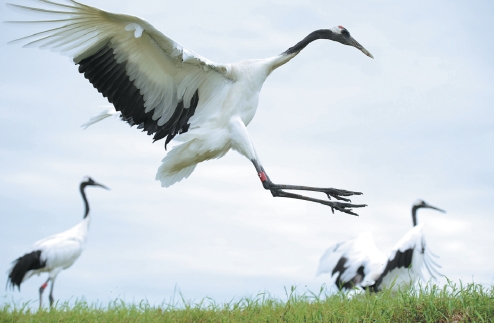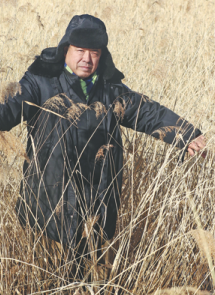
Red-crowned cranes thrive in the Zhalong National Nature Reserve in Heilongjiang province. (Wang Kai / Xinhua)
Targeting poachers and patrolling nature reserve ensure safety of migratory birds
Fu Jianguo seems quite busy in the spring when flocks of migratory birds return from the south to the Zhalong National Nature Reserve in Northeast China's Heilongjiang province. However, he asked for a three-day leave to accept a prize awarded by the China Wildlife Conservation Association for his work on protecting rare wild birds.
"Although it was not my first time to get such an award, it is still a great encouragement for me to stick to my way," said Fu, 57, head of a wildlife protection association in Lindian county, Heilongjiang.
Moreover, his team also got a group award at the ceremony, which was held on April 2 in Nanchang, Jiangxi province.
Established in 1979, the reserve, located in the western part of Heilongjiang, is a well-preserved primitive wetland.
Covering 2,100 square kilometers, the wetland lies on a major migratory route for birds from the Arctic to Southeast Asia, and is a stopover point and nesting area for a large number of species including storks, swans, herons and grebes.
Most of the wetland's core zone is located in Lindian county, occupying an area of 580 square kilometers.
Fu became involved in bird protection in 1984 as a guide for a wildlife research institute and became a ranger at Lindian Forestry Bureau three years later.
"In fact, I had become familiar with the wildlife since childhood," he said. "I got lots of chances to help take care of injured and young birds for my father who was also a wildlife protector at the bureau before retirement."
To Fu, protecting local wildlife is also a family tradition.
In 1988, he moved to live on Songhe Island, home of a rescue station for wildlife and never left. However, Fu discovered that the knowledge he had gained before was far from sufficient to do the work.
Therefore, in 1996, he entered Northeast Forestry University in Harbin, Heilongjiang, to study wildlife protection for two years.
"It was quite a precious experience, helping me get lots of knowledge about bird banding, bird-borne epidemic monitoring, prevention and treatment, which covers almost all my daily work," he said.
"However, the actual work is much more complicated than books."

Fu Jianguo patrols the nature reserve. ZHANG SHU/FOR CHINA DAILY
The long, bitterly cold winter in the northeastern province has become the major challenge to Fu during his fieldwork.
"Every day, we patrol the wetland to monitor birds and control illegal poaching in the reserve," he said.
"In the winter the extremely cold weather and snow-covered roads makes it harder to move quickly, whether on foot or by car."
On a freezing winter day in 2014, Fu found bird traps hidden in the snow. While rushing to remove them, he fell into an icy pit. His clothing froze solid in just a minute.
Sometimes, his work involves facing danger.
Fu recalls a case in which he helped police catch a poacher who illegally possessed a firearm in the autumn of 2014.
"When I found a poacher during patrol, I tried to stop him, but it had no effect. He pointed his firearm at me, ordering me to stop," he said.
Fortunately, nothing happened before the police arrived and no birds were injured by the poacher.
Under his leadership, more volunteers have joined wildlife protection efforts.
In the past 30 years, Fu and more than 60 volunteers of his team have saved and set free hundreds of rare birds.
"Every day during the two migration periods for birds, from March to May, and from August to October, there will be three or four volunteers patrolling with me," he said.
"We have set up a refuge for wildlife and spent more than 100,000 yuan ($14,800) on medicine and fodder for the injured or sick birds we saved."
Despite so many difficult and dangerous situations, Fu seldom thought of giving up, especially when he saw his beloved red-crowned cranes, oriental white storks and others birds thriving in their natural habitat.
"Bird protection is lifelong career for me and I will stick with it," he said. "I would like to see more people join us and more wild birds flying in the sky above the reserve."

